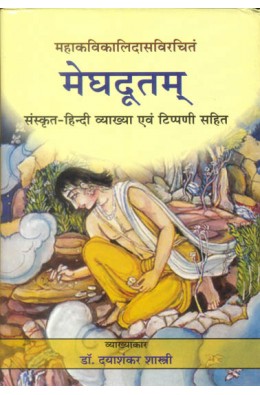Meghadootam- a cloud messenger


Meghadootam or in another word a “cloud messenger” is an 11 stanza poem written by Kalidas. Famous as one of his most prestigious works this poem is divided into two stanzas. These two parts are known as Purva megha and Uttara megha. The Meghadootam is the story of how a Yaksha who has been exiled to central India for a year as he has been neglecting his duties.
The Yaksha then convinces a cloud to take his message of love for his beloved wife who waits for him in Alaka city in the Himalayas. Promptly the Yaksha tells the cloud all the familiar yet beautiful sights he is going to see when he is en route to the destination.
The kind of literary style used in Meghadootam is known as Sandesa Kavya or messenger poem. Later, many poems were written in the same style. One more example of this style is the Hamsa Sandesh in which Lord Ram asks a Hamsa bird to carry his message to Sita and also describe the sights he is most likely going to see.
In the year 1813 Horace Hayman Wilson translated this beautiful poem into English. After that time Meghadootam was translated into multiple languages. The most traditional commentary on this poem was done by Malinatha. In the movie Water made by Deepa Mehta, you get to hear an excerpt of the same. Gustav Holst wrote a poem The Cloud Messenger and Meghadootam is known to be an inspiration for the same.

The scenes described in the poem have been an inspiration for many. One example of the same can be the drawings done by Nana Joshi. Composer Fred Momotenko had written the composition for 'Cloud-Messenger', music for a multimedia performance with the recorder, dance, projected animation and electronics in surround audio.
The Meghadootam has been translated into many Indian languages as well. Dr. Jogindranath Majumdar translated it into the Bengali language. It was published for the first time in the year 1969. Most of all it is an interesting rendition of a tale of love, longing, and separation. In conclusion, the poem should definitely be given a reading by all.